Okay, now we are having the real African experience. Woke up this morning to no water, no internet and, now, no electricity. But, it’s Sunday so we used it as an excuse to move slowly. We had a leisurely morning then decided to walk to Strawberry Café around 10:00 to see about getting an internet connection, electricity to charge our computers and some food.
Strawberry is a great little café on the way to the airport. It was about an hour walk, and once again we enjoyed using “local transport” (our feet) to get there. As we approached, we said a little prayer, knowing that the odds were high that we had made that hour journey only to find the café closed due to lack of electricity. We felt buoyed as we saw cars in the lot. Sure enough, they were open and bustling. Turns out they had purchased their own generator just two weeks earlier. It’s probably already paid for itself. Every foreigner and local business person in Ndola was there with their laptop.
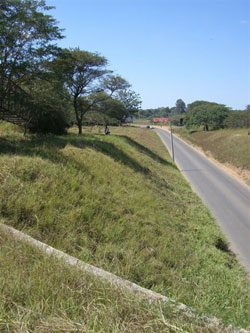
On the way to Strawberry
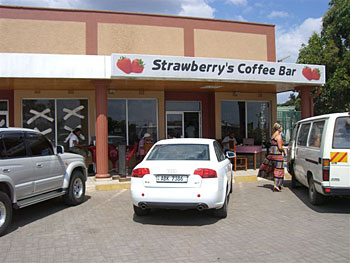
Our emergency internet café.
We ran into Katie, a lovely British woman we had met during our trip last summer. She works on a Gates Foundation funded AIDS project. With her was an American from New York who also works on the project. It was fun to see them.
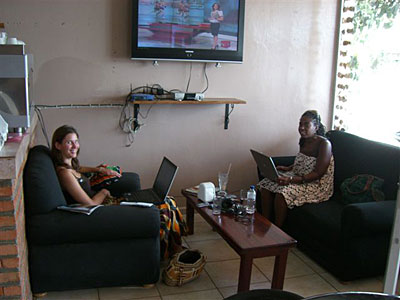
Katie and Donna.
Friday came to meet us at the café to discuss transportation for the projects. Perhaps you remember Friday is our mechanic angel who appeared out of nowhere last July when our car suddenly broke down on the side of the road. He and Dave spent the better part of three weeks making every effort to save the car. We admitted defeat during our trip last October and sold the car to someone who had the time and patience to fix it. Friday is perhaps one of the sweetest human beings you will ever meet. Hard to describe really what makes him so special—he just is. We are negotiating with him to help us with transportation this summer, when we have people with particular expertise coming in from the U.S. to assist in several areas of the projects. Friday has access to small passenger buses that we hope will be able to accommodate our whole group and thereby avoid the need to book multiple taxis everywhere we wish to go.
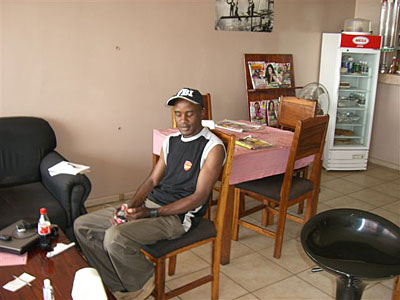
This photo does NOT do Friday justice.
After meeting with him, we jumped in Friday’s car to catch a ride back to the guesthouse. We rode along in envy in his new-to-him 2003 Toyota truck with roomy four-passenger cab that he had acquired for $1000 US!! The previous owner had taken terrible care of the car and just wanted out from under it. Friday is a mechanic with great skill and enormous patience and knew he would be able to give the car a second life. Our offers to buy it from him landed on deaf ears. “I am not ready to negotiate,” he smiled.
Soon after we returned to the guesthouse Theresa met us for a business meeting. It was a pleasant surprise that she brought along Simon, her charming beau. He is shy and polite and excused himself to the bar/café so we could talk business. We like to sit down with Theresa in a quiet spot at least once each trip just to check in and see how it is going. Does she feel like things are on track? Is there anything that is not working? Are there concerns she has? And it is a chance for us to communicate anything we would like the Ndola team to bring special attention to.
We were pleased to see that the women are keeping impeccable financial records, just as we had asked. It is all done by hand, of course. They have a record book with a section listing all expenses for each month.
During the meeting we also learned some fun things we had not known. The women have formed themselves into two cooperative groups. There are ten members in each group. Each group member contributes 20,000 kwacha (about $6) per month to a general fund to buy clothing, and the 200,000 kwacha pot rotates to a different member each month. Each member, when it is her turn, purchases a piece of chitenge and a top for herself and any other clothing items that her family needs.
Theresa also told us that, when the women first started getting a salary, she strongly encouraged them to go as soon as their money arrives to buy the food items they will need for the whole month. She said the tendency would be to buy the little sacks of mealie meal that are sold within Kantolomba, which a) ends up costing far more than buying one bulk bag per month, and b) leaves great temptation to spend the extra money on other things and not have enough money for food towards the end of the month. “It is a beautiful site,” she told us. “They ask for a half-day off from work and go to town and hire a truck to bring the large mealie meal sacks, jugs of cooking oil and other basic provisions to a central spot in the compound. Then each woman takes her share back to her home.” Listening to Theresa talk about that was exactly the feeling of being inside Beauty’s house and realizing there is nothing we need do other than provide the opportunity for development. The ingenuity, determination and cooperation are already here.
After the meeting, Dave, Theresa and Simon walked into town—Simon and Theresa to get a mini-bus home, Dave to go to the ATM. Life is paid for in cash in Zambia. The ATM is a vital, everyday ritual—even on Sunday.
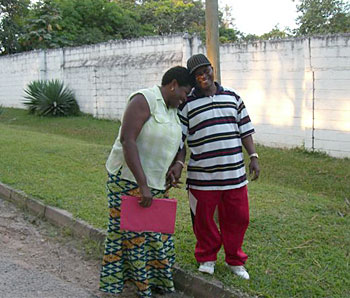
Theresa and Simon.
We got very lucky with the electricity coming back on just in time to cook ourselves a good dinner and boot up our computers to touch base with all of you.
(P.S.—Sorry, some days just don’t offer as many photo opportunities as others.)
